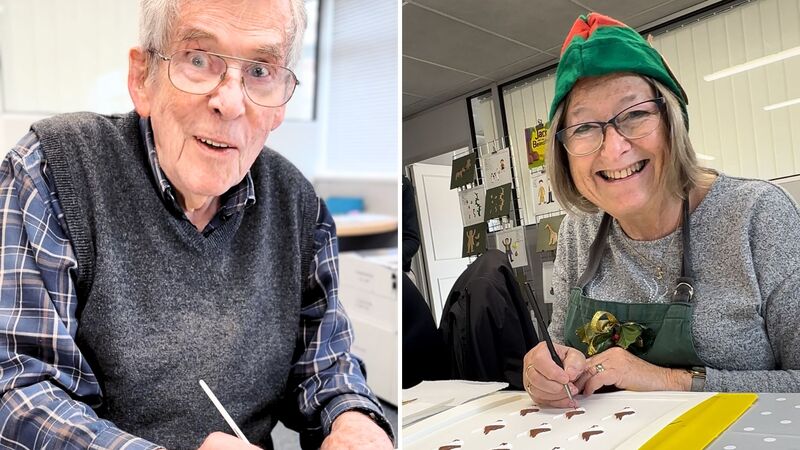You are viewing your 1 free article this month. Login to read more articles.
Sally Rooney | 'You should make work that you don't necessarily expect people to like or love'
Anyone who is concerned that conversation is a dying art among the young needs to read Sally Rooney’s astonishingly assured début Conversations with Friends (Faber, June). A delight from the first page to the last, it is a coming-of-age tale told by a young woman who is finding out who she is - and who she loves.
It is narrated by Frances, a bright 21-year-old university student who lives in Dublin. She is also a poet who performs at spoken word nights with her best friend from school, the beautiful and self-assured Bobbi, who was once suspended from their secondary school for scrawling “fuck the patriarchy” on a wall near an image of the crucifixion. Bobbi used to be Frances’ girlfriend and although they have split up, they seem as close as ever. It is at a poetry night that Frances and Bobbi meet Melissa, a well-known photographer and journalist. After the bar closes, she invites them back to the house she shares with her handsome husband Nick, an actor, for a drink.
That night is the first encounter of many as Frances and Bobbi are slowly drawn in to the orbit of the older, more glamorous couple. Frances, by nature one of life’s observers, initially holds herself aloof and slightly apart, but she gradually becomes closer and closer to Nick, and they begin an affair that will have consequences for every relationship in Frances’ life.
Four corners
When we meet at her publisher’s central London office, Rooney - who has flown over from her home in Dublin and proves to be a thoroughly engaging and articulate interviewee - explains that she began with an interest in exploring the dynamic between two close female friends who were previously lovers, and an older married couple, and “the various relationships that can exist within that. I mean between four people - it is incredible how many different dynamics there are.”
When I observe that the relationships between the four central characters don’t fall into neat categories, and that one would have to use so many words to describe precisely what and who they are to each other, Rooney is delighted. “It’s fascinating that you use that exact phrase, that you’d have to use so many words to describe who they were, because I think I had to use the whole book. If you really wanted to understand the relationship between even Frances and Bobbi alone, you’d have to read the whole book because [their relationship] really is that layered and complex,” she says. “I don’t mean that in a self-flattering way, I think honestly that everyone’s relationship with everyone else becomes so its own thing, so separate from every other relationship, that it’s impossible to comprehend without really getting into it very deeply.”
Conversations with Friends is also a novel that asks what it really means to be intimate with another person. As Rooney says, there are people in the book with whom Frances is sexually intimate but not at all emotionally intimate. Conversely, for much of the novel she and Bobbi aren’t romantically involved “and yet they are obviously each other’s other half and do everything together, so there’s the sense that [theirs is] an intimacy that transcends conventional forms of intimacy.”
Interestingly, Rooney sees the actions of the characters - particularly Frances’ affair with Nick - as partly stemming from their political convictions “because they see that what we have understood as the nuclear family, the conventional ways of being intimate, are often quite repressive structures that are not really very liberating. They don’t give people true intimacy or true satisfaction, so [the characters] feel a need to work outside those boundaries in order to establish relationships of their own.”
Chattering classes
While all this is happening, the characters, particularly Frances and Bobbi, talk - and talk. They discuss everything: art, literature, sex, feminism, politics and, of course, each other. These intense conversations are wide-ranging, clever, funny, mind-expanding and thought-provoking. In their volubility and willingness to discuss anything and everything, her characters reminded me of those found in the films of Woody Allen. While Rooney has reservations about the man himself, she is a fan of his oeuvre, and she also admires the work of indie filmmakers Noah Baumbach and Greta Gerwig. “What I really like about Woody Allen’s films is that there’s a real investment in personal relationships. There is the idea that this is a serious concern worth making serious art about - how we love other people and how we can negotiate our relationships with them.”
You should make work that you don’t necessarily expect people to like or love, [and be] willing to put stuff in there that isn’t likeable
A literary influence on Conversations with Friends was Sheila Heti’s 2013 novel How Should a Person be? (Vintage), which left a lasting impression on Rooney. “It has a female first-person narrator who really challenges the reader and who is willing to display the worst parts of her personality to the reader. [She has] absolutely no intention of being liked or loved.” It made Rooney realise that “you should make work that you don’t necessarily expect people to like or love, [and be] willing to put stuff in there that isn’t likeable”.
Personally, I found Frances to be a beguiling character. At 21, she is well past adolescence, but not yet an adult, as Rooney points out.
“She doesn’t spend much of the book thinking, ‘What do my classmates think of me?’, ‘What does the audience of my spoken word poetry think of me?’” Beyond the opinions of Nick and Bobbi, Frances simply doesn’t care. “I think people probably find that offputting. Some people would want Frances to be questing for their love, but she’s obviously not.”
Conversations with Friends may be Rooney’s first published novel, and at 25 she is still very young, but she has been writing since childhood - and finished her first novel aged just 15. The house she grew up in, in County Mayo, was “full of books” and she always felt that her parents would be “open to me announcing that I was going to be a writer. That felt like something I was allowed to say.”
In terms of experience Rooney had had a couple of poems published in The Stinging Fly, an Irish literary magazine that focuses on new writers, when she began work on Conversations with Friends. It began life as a short story that “kept growing” until Rooney realised it was actually a novel. Three months later she had 100,000 words under her belt which gave her a huge mental boost. “I was filled with ‘Oh my God, I’ve written a novel— I can do anything!’” she says, laughing. Her short fiction and essays were published in Granta and The Dublin Review respectively, and caught the attention of agent Tracy Bohan at The Wylie Agency. When the finished novel was sent to publishers, a seven-way auction ensued, with Faber victorious and Conversations with Friends is now the publisher’s lead début for 2017. Her story “Mr Salary” has just been shortlisted for the 2017 Sunday Times EFG Short Story Award. Something tells me that the conversation about Sally Rooney is just beginning...
Photo credit: Jonny L Davies









